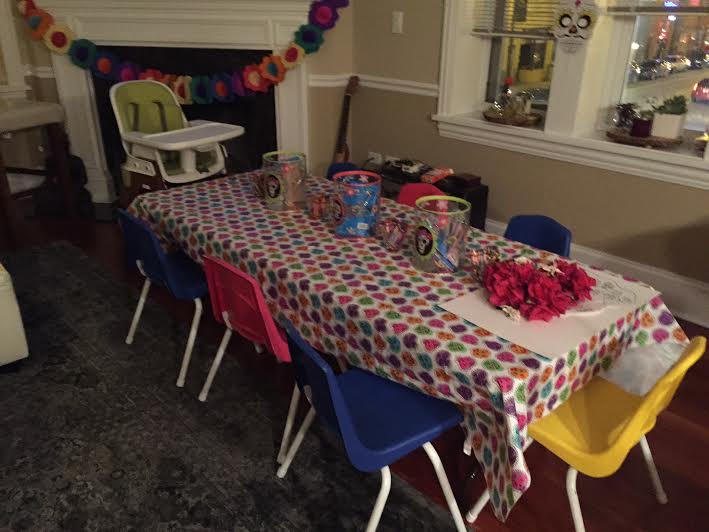The Only Advice You'll Ever Need For Parenting A Toddler
/Life became a bit more complex when little Gibson turned 2. Like clockwork, it appeared the shift had taken place and the deeply-feared terrible 2's had kicked into high gear. WTF?! What happened to our peaceful, playful, happy little angel?! Hitting, spitting, biting and crying LOTS AND LOTS OF CRYING had replaced all the hugs, kisses and snuggles...literally like that! Oh dear, and word on the street was, this shit wouldn't get better for YEARS...Um, are you sure you didn't mean weeks??
I realized halfway through an already difficult pregnancy with a tantruming 2-year old that patience would wear very, thin very fast. So what does any struggling mother do in a similar situation?? Turn to the web. And that's where I found the best advice that's helped us navigate through these eh, unusual times.
The woman who wrote this article - author, blogger, speak Sheila Gregoire - uses her faith, Christianity in her work. Funny that a Jewish girl from the valley with less-than favorable feelings about organized religion would find such value in her teachings. That said, at the core, parents generally want the same thing...a loving, peaceful environment at home....with some sanity sprinkled on top.
So with that Haute Mommies, we implemented some Sheila's advice here at home with Gibson - setting him up with the trusty ol "Time Out Chair" for 2 minutes (same number as his age) when he acts up, and hand to heart, we've seen dramatic results in literally a week. The babe's less irritable, more aware and overall, happier. With that, we pass along this wisdom: Here are 5 Tips For Turning The Terrible Two's Into Terrific Twos (her words not mine :)
1. Keep Your Toddlers to a Schedule/Routine
Institute a schedule or routine so that the children know what to expect, and you are less likely to need much formal discipline.
One of the reasons kids act out is because they are confused or overwhelmed because they don’t understand what is going on. That’s why kids are more likely to act like brats in a new situation meeting all your relatives, for instance. It’s unfamiliar.
On the other hand, most kids thrive with a schedule.
As much as possible, then, stick to one! Up at 7, play until 7:45, then breakfast. Play until 10, then outing. Home for lunch. Do a craft. Take a nap. Etc. etc. And try to make outings have similar themes! Have toys that you only take on outings. Go to the library at the same time on the days that you go. When kids know what to expect, they are far more likely to relax and enjoy it than to get upset and start acting out.
2. Make Allowances For Toddlers
Kids are kids, and often we expect them to be able to behave better than perhaps we should.
When my girls and I used to grocery shop when they were babies and toddlers, I would stick them into the grocery cart and then head immediately to the produce department, where I would buy two bananas. Then I’d go to the checkout and pay for my two little bananas. I’d keep the receipt handy, in my pocket, and I’d let the girls eat the bananas while we shopped. That kept them from fussing or from trying to touch all the food. If they already had food, they were far more likely to enjoy the experience.
It’s unrealistic to expect a 2-year-old to sit calmly in a grocery cart in the middle of all that food for half an hour or 45 minutes while you get a huge shop done.
Buy them a healthy snack at the beginning, and you get away from a lot of trouble.
Similarly, if you’re waiting at a doctor’s office, or at another appointment, it’s unrealistic to expect them to sit calmly there, too. I always kept a few small toys and several books in my bag, and whenever we were out at stuff like that I’d whip them out and keep them occupied. It works well at restaurants, too.
I know it doesn’t look like the first two have much to do with discipline, but I believe that if we aren’t unreasonable with our children, and if we have a routine, kids in general will behave better. Now let’s turn to the times when they don’t behave.
3. Keep Discipline Immediate and Quick.
Kids don’t have long attention spans, and they don’t always understand things when there’s too much time between infraction and punishment.
If they’ve just bitten somebody, then you must respond right then. If my children were at playgroup, for instance, and they did something horribly inappropriate, like biting or throwing a tantrum, we would leave. They were very upset about that, and it often made the tantrum worse, but they had to learn that they couldn’t act that way in that setting.
Kids need to learn that in public there are certain things you can’t do, like screaming, or hitting, or being violent.
If they were, they lost their chance to play.
If you’re going to institute something like this, don’t lecture them or be mad. Just treat it like it’s natural. “It’s too bad we have to leave now, but that’s what happens when you bite. Maybe we’ll be able to come back tomorrow if you decide not to bite again.” Then don’t yell at your kids. You’ve already punished them. Let them understand that it was their choice to leave, since they did the biting. Next time, if they make a different choice, then you can stay.
But it must be immediate.
Don’t dilly dally and wait around and second guess yourself, or you’ve lost the chance. You can always come back another time, and it does help kids learn to control themselves when they see that they lose something important to them.
4. Be Consistent–or You Reinforce the “Terrible Twos”
It’s better NOT to discipline or threaten if you’re not going to follow through in the same way all the time.
If you are going to make it a rule that everyone tries two bites of everything on their plate, for instance, then you have to make them have two bites of everything. You can’t do it one night and not the rest, or you’ll have to start from scratch all over again. They’ll know they can push the limits.
If you’re going to let it go sometimes, but not others, you just confuse kids, and you actually put yourself in a worse situation.
It’s better to have small consequences that you always enforce than some big ones you’re haphazard about, because you just confuse kids about the rules.
So don’t threaten something in anger. Ask yourself, “can I really follow through? Can I follow through like this on another day, too? Is this something I can regularly do?” And if it’s not, don’t do it. When kids feel there’s a CHANCE they can get away with something, they’re more likely to push the limits than if they feel like there are no limits at all, if that makes any sense. It’s better not to do anything than to do it halfway.
With toddlers, choose small things to discipline about. Remove a toy. Have them stand in time out for 3 minutes. Take them out to the car if they’re acting up in a restaurant. Leave a playgroup. As for spanking, you can do this if you want to, but I never recommend it because some people do spank in anger, and that’s dangerous. If you don’t spank in anger, and you’re controlled and calm, then that’s really up to you. I just don’t want to get involved in that decision-making chain of yours!
Let me tell you, though, that some research has shown that spanking is much more effective for boys than for girls. Girls often react badly. Boys often react well. Nevertheless, you know your kids, and you choose what is best for them. (Here are my top 10 discipline ideas that don’t involve spanking).
One more thing:
5. Try Not To Yell
Yelling scares kids and undermines your authority.
Enforce consequences instead in a nice voice. “It’s too bad you can’t play with bunny anymore today, but Mommy warned you, and I have to take it away now.” Yelling creates a horrible environment in the home, and it’s not necessary except in really bad circumstances. Kids are far more likely to accept a consequence when you announce it in a firm but normal voice than if you go off the deep end.
For More from Sheila: http://tolovehonorandvacuum.com/2010/01/discipline-in-terrible-twos/






























